AI in real estate not only makes the properties smarter but also more responsive to the evolving needs of both investors and occupants.
Updated 16 April 2024

CTO at Appventurez
We are living in a world that is driven by smart, intelligent, and interconnected technologies, which makes the role of artificial intelligence in different industries highly significant.
Technology has started reshaping industries across the globe by not only improving the existing processes but also by unlocking entirely new possibilities across various sectors. One such industry that has immensely adopted artificial intelligence development services and has experienced tremendous growth is real estate.
Real estate has implemented futuristic technology by integrating AI-powered tools or software developed by AI developers to provide realistic and interactive experiences of the properties to facilitate communication between the clients and the real estate agents.
In this blog, we will further explore the growing role of AI in real estate, how the technology benefits the industry, and how the technology is integrated into the industry.
Amid the growing demand for AI in real estate, businesses are now leveraging iOS and Android app development services to enhance their real estate business operations. The statistics below further explain the evolving role of artificial intelligence in real estate.
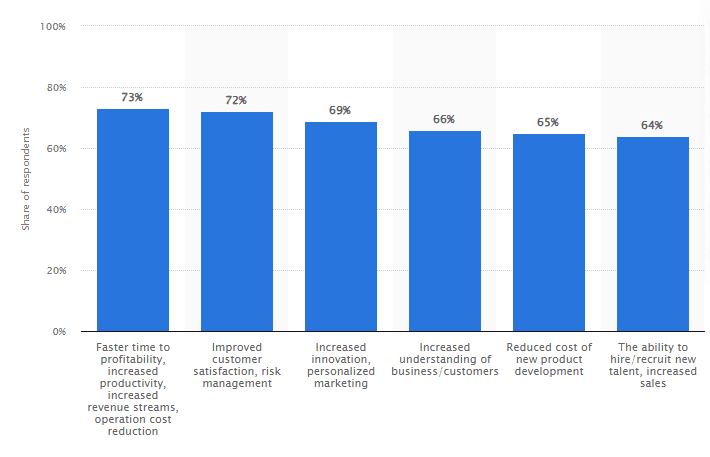
The adoption of AI in real estate market represents a significant shift in the acquisition, management, and analysis of real estate. Real estate professionals have realized the advantages and the potential of AI technologies and also understood the significance of leveraging data for profitable outcomes.
Notably, according to the Global Industry Analysis and Forecast, the use of artificial intelligence in the real estate market is expected to reach $1335.89 billion by 2029 further reflecting its enhanced role in enabling better decision-making and uncovering valuable insights from the data patterns through the machine learning development services.
The diverse role of Artificial intelligence in real estate can be understood from the points mentioned below:
The collaboration of AI and real estate continues to make significant developments in the industry. Let’s further explore the most significant use cases of AI in real estate industry:
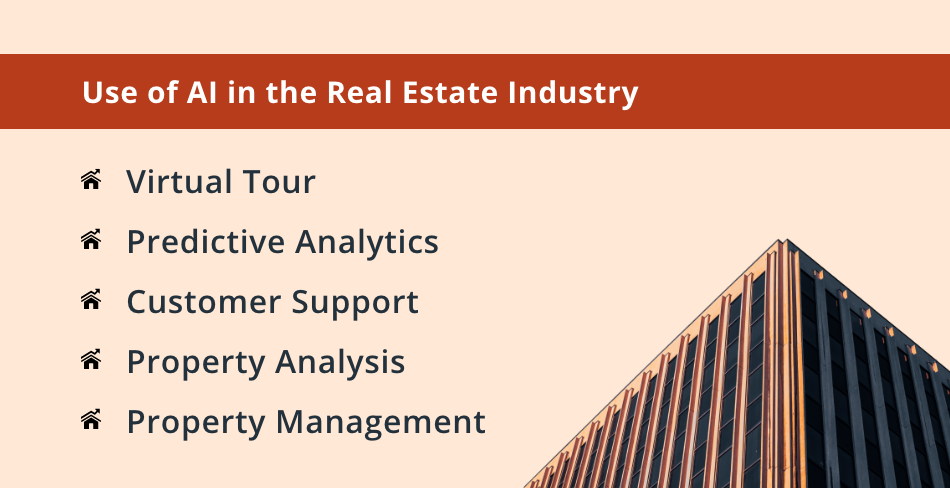
The most common and practiced usage of AI in real estate is predictive analytics. When you see an estimate of the value of a property, it is generally because of the impact of predictive analytics used in real estate mobile apps.
There is no doubt that forecasting is important when it comes to commercial real estate. Hence, investors, agencies, and economists use AI in commercial real estate to predict where the market is headed, hoping to get an edge on the competition and buy at the right price.
With the rise of the latest AR VR development services, potential investors can get a realistic view of the property without even stepping foot on the site, illustrating how to use AI in real estate effectively.
Realtors can offer virtual tours to the buyers that give a true sense of how the space looks and feels. It also helps in maintaining social distancing norms and prevents the pre-booked viewings from cluttering a realtor’s calendar.
Apart from the integration of advanced technologies such as web3 real estate, AI tools for real estate help streamline property management in various ways. It enables businesses to track rental and property listings, lease agreements, tenant applications, maintenance requests, and other essential information.
Furthermore, AI can also scan property documents for common errors like empty fields, missing signatures, and so on.
AI in customer support has revolutionized businesses across industries. Seeing the growing potential of AI in customer service, now the companies in real estate are also capitalizing on AI-powered solutions.
For instance, chatbot development services in real estate are now increasingly used to respond to consumers’ queries promptly. With AI-powered real estate, users need not wait for longer periods to get the answer, further leading to enhanced customer experience.
A common realtor is not able to evaluate all the small details and visualize the right price for the users, however, AI in real estate can help the businesses in providing correct information about the property.
For instance, artificial intelligence can evaluate the seasonal light disparities and verify the realtors’ adverts for sunny homes. It can also evaluate the property features such as home decor, size, number of rooms, etc. to decide on a viable price range.
The application of AI in real estate results in multiple benefits. Some of the most noted advantages are:
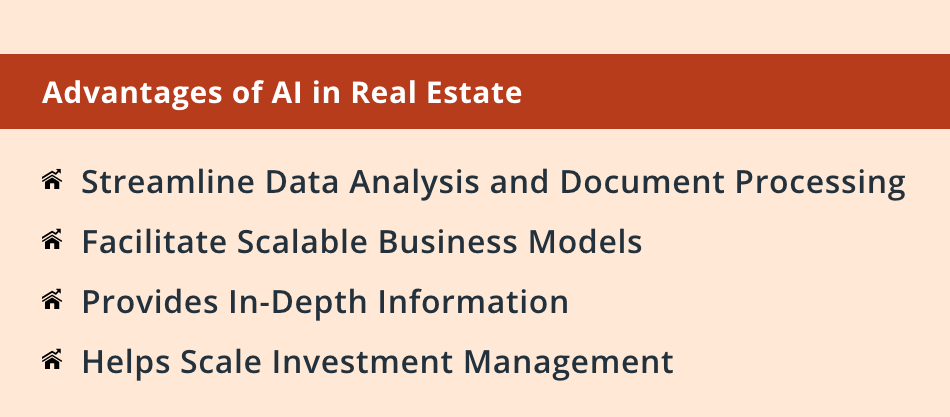
As the real estate holding expands, AI in real estate helps facilitate the transition to more scalable business models. Updates to the investments and leasing operations through AI may necessitate reimaging business structures and roles.
Scalable business models not only accommodate growth but also position real estate professionals to adapt swiftly to the market changes.
AI in real estate helps streamline document analysis by expediting tasks that are often time-consuming.
The technology efficiently extracts and structures data from various formats, including appraisals, lease agreements, and loan papers. This acceleration enhances document organization, further enabling quick access to crucial information.
The integration of AI in real estate enables an intensive focus on information, particularly confidential data related to the net operating income in the real estate portfolios.
This deep scrutiny provides invaluable insights for making informed investment decisions, further supporting internal corporate functions. The ability to analyze data at this level also contributes to strategic decision-making.
Using AI in real estate industry facilitates efficient scaling, further allowing the real-estate professionals to seamlessly handle portfolios of various sizes. This scalability not only enhances operational efficiency but also opens up new avenues for diversified investment strategies.
Prominent companies in real estate are leveraging advanced technologies such as artificial intelligence, IoT app development services, robotics, machine learning, and others to catalyze the transformation in the real estate industry. Below are some of the top examples of companies that use AI and ML to attract more investors.
The trusted company in the real estate industry leverages artificial intelligence technology to analyze digital photos and relevant data to generate free property value estimates. The AI-driven estimates project property value with a national median error rate of 2.4%, further contributing to highly accurate predictions.
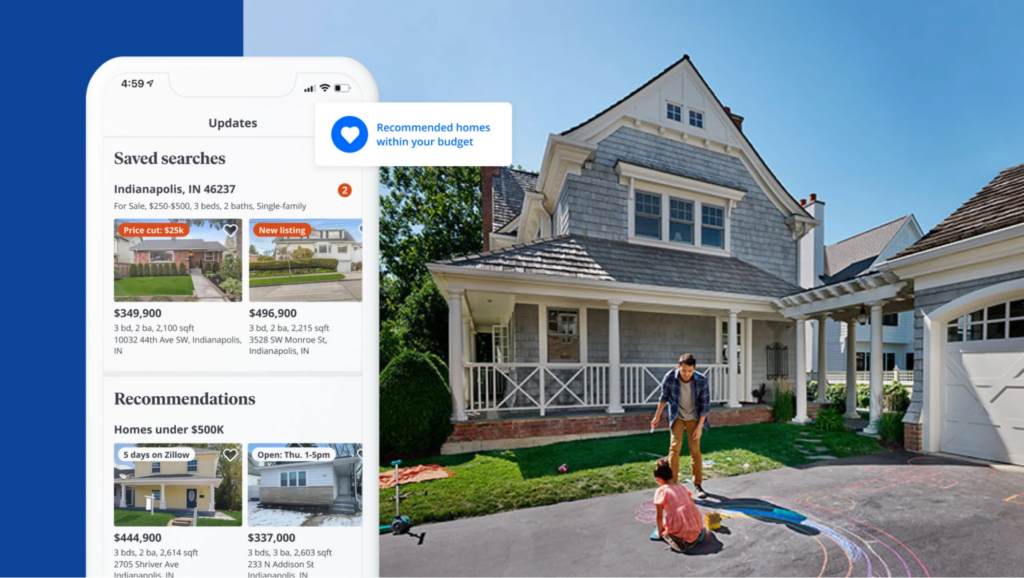
Source: Zillow
It is a prominent real estate marketplace that utilizes AI technology to provide personalized property recommendations and enhance the user experience. The platform, by analyzing user behavior, search history, and preferences offers tailored property suggestions matching the users’ interests and preferences.

Source: Trulia
This advanced technology-powered real estate broker, lender, instant home-buyer, title insurer, and renovations company uses AI to provide automated property valuations. The company combines AI-driven data analysis with human expertise to offer accurate valuations to realtors.
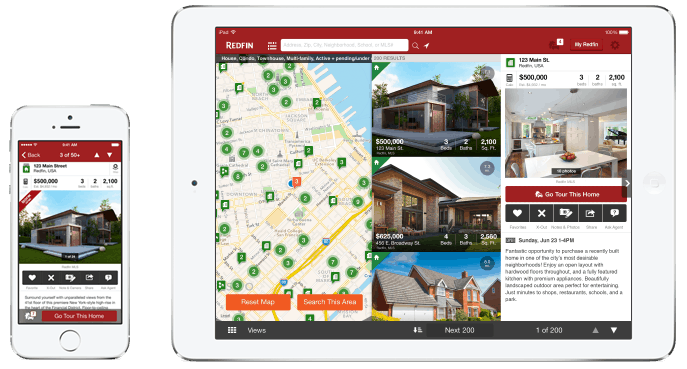
Source: Redfin
To keep up with the pace of AI applications in real estate industry, it becomes significant to foresee future trends. Here are some of the real estate AI trend predictions for you to watch out for:
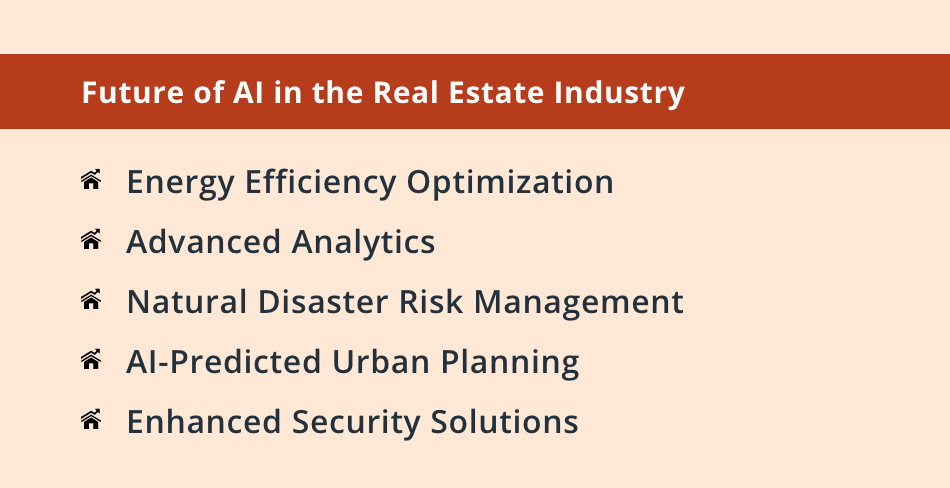
Suitable property is the new normal and real estate professionals have their biggest concern of energy consumption when it comes to sustainability. The data analysis forte of AI in real estate can help professionals gain insight into the building’s energy consumption patterns.
AI real estate solutions can also recommend energy optimization alternatives to reduce energy usage and cost to minimize the environmental impact.
A lot goes into a real estate marketer trying to sell the property to the tenants/investors hunting for the best deals. However, the integration of advanced technologies such as big data development services and deep learning is making the use of data analytics a common practice in real estate.
Let’s dive into some of the futuristic AI analytics trends that are anticipated in the real estate industry:
The use of AI in real estate will aid in an informed decision-making process, to enhance the safety measures of the property, risk mitigation strategies, post-disaster management planning, and buying or renting a property in disaster-prone areas.
Urban planning encompasses various characteristics and principles that guide the development and management of urban areas for spatial organization, infrastructure development, transportation, security, disaster preparedness, and more.
AI algorithms will help analyze vast datasets, including traffic patterns, demographics, and environmental factors, to inform city planning decisions. AI-predicted urban planning promises to create more efficient, sustainable, and livable cities, further improving the quality of life for urban dwellers.
When it comes to futuristic security solutions, artificial intelligence can provide unmatched security to occupants and their properties by utilizing its analytical skills, automated responses, and highly webbed integration to various systems present in properties.
In case of any breach, AI in real estate development can enable automated and immediate responses like notifying law enforcement, locking down building access, or activating alarm systems.
For the real estate businesses to sustain in the transformative phase of the industry, AI software development services are the best approach forward. Given the stats and the human explorations of AI applications in various industries, the adoption of AI in real estate industry can be expected to a great extent.
This is where the leading AI development company, Appventurez, comes in with its pool of expert designers and developers who are skilled in providing custom solutions to businesses of all sizes.
Our dedicated AI developers will give your real estate business a touch of artificial intelligence with custom real estate app development services that provide your business a competitive advantage and benefits of this growing technology that facilitates unprecedented business growth.
Q. What Does AI Mean in Real Estate?
Artificial intelligence in real estate helps transform the industry by enhancing customer experiences, automating processes, increasing productivity, and providing valuable insights for better decision-making, further reshaping our interactions with the real estate market.
Q. How to Use AI for Real Estate?
Real estate professionals can use AI-powered tools to analyze market conditions, evaluate property values, and identify investment opportunities with greater precision.
Q. How much does it cost to develop an AI-based real estate app?
The cost of developing an AI-based real estate app can vary significantly based on several factors. Some real estate AI cost considerations that the business runner can keep in mind are features and functionalities, UI/UX design, third-party integrations, location of development team infrastructure and hosting, and more.
Q. Can AI replace real estate agents?
AI in real estate will simplify property searches, make property valuations more accurate, and predict market trends. Property management will become more efficient and tenants will enjoy better experiences. Overall, the technology will enhance efficiency and improve the real estate industry.
Q. How to use AI for real estate investing?
By using AI algorithms to sift through and analyze data, you can identify trends and forecast future property values with unprecedented precision. For instance, artificial intelligence can help you predict the latest trends by analyzing past market data, economic factors, and even local news, further giving you a competitive edge in decision-making.


Elevate your journey and empower your choices with our insightful guidance.

CTO at Appventurez
CTO and Co-Founder at Appventurez, Sitaram Sharma has 10+ years of experience in providing world-class digital solutions. As a CTO, he brought his expertise ranging from product enhancements to advanced technological integrations, while focusing on the consistent growth of the team.
You’re just one step away from turning your idea into a global product.
Everything begins with a simple conversation.